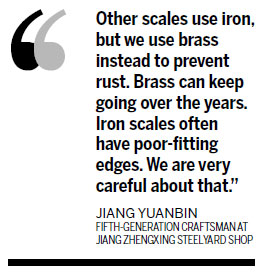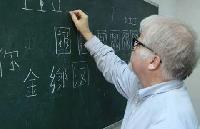An honest living
However, the most important thing when making the scales is to obey the traditional rules that guarantee accuracy of measurement.
Jiang's scales have always adhered to the official units of the day.
"These 25-kilogram weights were issued by the government since the founding of new China in 1949," Jiang says, pointing to the weight in front of him.
In order to ensure accuracy, Jiang checks and adjusts the weights every six months. "It's the only way to guarantee precision and accuracy."
Jiang Yuanbin's father, Jiang Duanshan, was respected by the local community, both for his craftsmanship and his skill at resolving local disputes, even taking care of orphans when the need arose.
Jiang Duanshan's honesty and integrity were essential to his professional reputation, since so many people relied on the accuracy of steelyard scales to do business. At times, he was asked to make scales that gave false readings, but he always refused. Now his reputation goes on with his son Jiang Yuanbin and his daughter Jiang Yuzhen.

"One inaccurate set of scales can result in millions of people being cheated," Jiang Yuanbin says. His father told him that the reputation and prosperity of the family depends on making honest scales. "That is our family tradition."
In 1997, the government decreed that the use of steelyards was to be discontinued in cities. However, their use is still common in many smaller towns and villages, with farming and trading families relying on them to weigh their produce.
Different steelyards make use of different weights, and their range dictates the types of produce to which they are best suited. Jiang says that the 200-kg steelyards are mainly used for pigs, and the 60-kg are best for cotton. The 80-kg to 100-kg scales, meanwhile, are used for fish.
While Jiang's family has mastered the skills of making accurate scales, they have had to work hard to pass those skills to each new generation. Jiang's own son and daughter have both absorbed the skills of the family business, but it is his son who looks most likely to continue the tradition, having taken a keen interest from an early age.
Jiang says the skills of a steelyard maker are dying out, and to help preserve them, he has applied for the craft to be registered as an intangible cultural heritage of the Xinzhou district.
Recently, more and more people have come to Jiang's shop out of curiosity and to buy the steelyards as cultural objects, rather than for practical purposes. They are keen to see the famous "conscientious scales" and pass on the lessons in honesty and craftsmanship to their children.
Jiang is happy to see that his family tradition has both practical applications and educational value too.
"Being a good man, doing nice work" is a tradition the Jiang family aims to continue for generations to come.


















